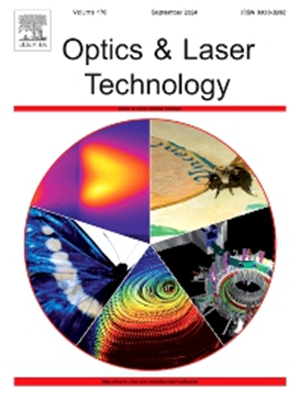Multi-feature fusion target recognition method based on forward-looking dual linear array scanning laser fuze
IF 4.6
2区 物理与天体物理
Q1 OPTICS
引用次数: 0
Abstract
In this study, to address the issues of short rendezvous time between the projectile and target as well as the weak target acquisition capability under high-speed rendezvous conditions, a new forward-looking dual-linear array rotational scanning laser fuze based on linear array laser detectors is proposed. The working principle of this fuze is discussed, according to which the parameters such as the maximum adjacent beam angle, maximum adjacent pulsed beam angle, and minimum pulse frequency are derived. Considering the spatiotemporal rendezvous relationship between the “cylindrical” target and the scanning light field, a multi-line laser scanning target size calculation model is established to determine the contour features of the target. Additionally, a multi-feature information fusion method is proposed, enabling the classification and recognition of targets of different sizes. To mitigate laser signal interference from pseudo-pulse signals, a time window denoising filtering method is adopted based on the characteristics of the multi-line laser target echo signal. In addition, the impact of different combinations of fusion features, the number of fused frames, and detection frequency on the recognition performance is analyzed. The experimental and simulation results show that the proposed forward-looking dual-linear array rotational scanning laser fuze effectively extends the duration of scanning rendezvous and captures more frames of target information. Moreover, integrating target contour features significantly enhances the recognition capability for targets of different sizes. Additionally, the introduction of target contour features can significantly improve the recognition capability for targets with different sizes.
基于前视双线阵扫描激光引信的多特征融合目标识别方法
本研究针对射弹与目标交会时间短、高速交会条件下目标捕获能力弱等问题,提出了一种基于线性阵列激光探测器的新型前视双线性阵列旋转扫描激光引信。论述了该引信的工作原理,并据此推导出最大相邻光束角、最大相邻脉冲光束角和最小脉冲频率等参数。考虑到 "圆柱形 "目标与扫描光场之间的时空交会关系,建立了多线激光扫描目标尺寸计算模型,以确定目标的轮廓特征。此外,还提出了一种多特征信息融合方法,可对不同尺寸的目标进行分类和识别。为减轻伪脉冲信号对激光信号的干扰,根据多线激光目标回波信号的特点,采用了时间窗去噪滤波方法。此外,还分析了不同的融合特征组合、融合帧数和检测频率对识别性能的影响。实验和仿真结果表明,所提出的前视双线阵旋转扫描激光引信有效地延长了扫描交会的时间,并捕获了更多帧的目标信息。此外,整合目标轮廓特征还能显著增强对不同大小目标的识别能力。此外,引入目标轮廓特征还能显著提高对不同大小目标的识别能力。
本文章由计算机程序翻译,如有差异,请以英文原文为准。
求助全文
约1分钟内获得全文
求助全文
来源期刊
CiteScore
8.50
自引率
10.00%
发文量
1060
审稿时长
3.4 months
期刊介绍:
Optics & Laser Technology aims to provide a vehicle for the publication of a broad range of high quality research and review papers in those fields of scientific and engineering research appertaining to the development and application of the technology of optics and lasers. Papers describing original work in these areas are submitted to rigorous refereeing prior to acceptance for publication.
The scope of Optics & Laser Technology encompasses, but is not restricted to, the following areas:
•development in all types of lasers
•developments in optoelectronic devices and photonics
•developments in new photonics and optical concepts
•developments in conventional optics, optical instruments and components
•techniques of optical metrology, including interferometry and optical fibre sensors
•LIDAR and other non-contact optical measurement techniques, including optical methods in heat and fluid flow
•applications of lasers to materials processing, optical NDT display (including holography) and optical communication
•research and development in the field of laser safety including studies of hazards resulting from the applications of lasers (laser safety, hazards of laser fume)
•developments in optical computing and optical information processing
•developments in new optical materials
•developments in new optical characterization methods and techniques
•developments in quantum optics
•developments in light assisted micro and nanofabrication methods and techniques
•developments in nanophotonics and biophotonics
•developments in imaging processing and systems

 求助内容:
求助内容: 应助结果提醒方式:
应助结果提醒方式:


